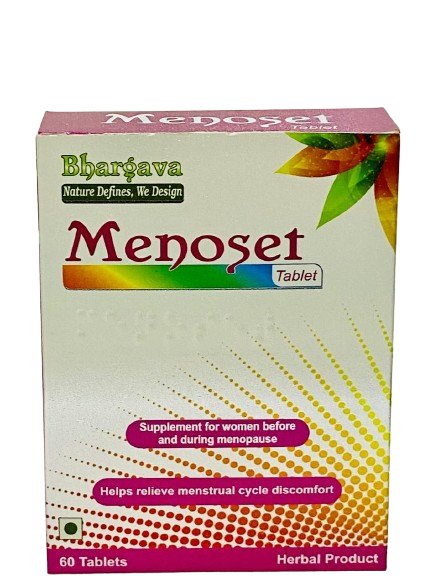Every month, women bleed when the uterus lining comes off. This is a normal and natural process of the female body. But sometimes, the bleeding may not happen on time or at all. This is called a delayed period, and it can have different causes. A delayed period can make many women feel nervous and scared, especially if they have sex or want to get pregnant.
In this article, we will explore some of the common causes and solutions for a delayed period, and also introduce Menoset, a natural supplement that can help balance hormones and regulate menstrual cycles.
What is a normal menstrual cycle?
A normal menstrual cycle can vary from 21 to 35 days in length, with an average of 28 days. The first day of bleeding is considered the first day of the cycle. The length and amount of bleeding can also vary from person to person, but usually lasts between two and seven days.
It is normal for the cycle length to fluctuate slightly from month to month, but if it varies by more than seven to nine days, then it is considered irregular. Irregular cycles can be a sign of an underlying health condition or a lifestyle factor that affects the hormones.
What are some of the common causes of a delayed period?
There are many possible reasons why a period may be late or absent, besides pregnancy. Some of the most common ones are:
- Stress: Chronic stress can affect the hypothalamus, the part of the brain that regulates the hormones that control the menstrual cycle. Stress can also cause changes in the daily routine, eating habits, sleep patterns, and physical activity, which can all impact the cycle. To reduce stress, it is important to practice relaxation techniques, such as meditation, yoga, breathing exercises, or hobbies. It is also helpful to seek professional help or support from friends and family if needed.
- Low body weight: Having a low body fat percentage can interfere with ovulation, the process of releasing an egg from the ovaries. This can cause irregular or absent periods. This can happen in people who have eating disorders, such as anorexia or bulimia, or who exercise excessively. To restore a healthy weight and cycle, it is essential to seek treatment for the eating disorder and to follow a balanced diet and a moderate exercise routine.
- Obesity: Having a high body fat percentage can also affect the hormones that regulate the menstrual cycle. Obesity can cause the body to produce too much estrogen, a female hormone that can inhibit ovulation and cause irregular or heavy periods. Obesity can also increase the risk of other health problems, such as diabetes, high blood pressure, heart disease, and some cancers. To lose weight and improve the cycle, it is advisable to follow a healthy diet and a regular exercise program, and to consult a doctor for guidance and support.
- Polycystic ovary syndrome (PCOS): PCOS is a common hormonal disorder that affects up to 10% of women of reproductive age. It is characterized by multiple cysts on the ovaries, high levels of male hormones, insulin resistance, and irregular or absent periods. PCOS can also cause other symptoms, such as acne, excess hair growth, weight gain, and infertility. The exact cause of PCOS is unknown, but it is believed to be influenced by genetic and environmental factors. To manage PCOS and restore the cycle, it is important to follow a low-carbohydrate diet, exercise regularly, take medication to lower the male hormones and insulin levels, and use hormonal birth control or other methods to induce ovulation and prevent pregnancy complications.
- Perimenopause: Perimenopause is the transition period before menopause, the permanent end of menstruation and fertility. Perimenopause can start as early as the mid-30s or as late as the late 40s, and can last from a few months to several years. During this time, the ovaries produce less estrogen and progesterone, the hormones that regulate the menstrual cycle. This can cause irregular, heavy, or light periods, as well as other symptoms, such as hot flashes, night sweats, vaginal dryness, mood changes, and reduced libido. To cope with perimenopause and its symptoms, it is helpful to maintain a healthy lifestyle, use hormone therapy or natural remedies to balance the hormones, and use lubricants or moisturizers to relieve vaginal dryness.
What are some of the solutions for a delayed period?
The best solution for a delayed period depends on the cause and the individual situation. However, some of the general tips that can help restore a regular cycle are:
- Keep track of your cycle: Using a calendar, an app, or a journal, record the start and end dates of your periods, as well as any symptoms or changes that you notice. This can help you identify any patterns or irregularities in your cycle, and also help your doctor diagnose and treat any underlying condition that may be affecting your cycle.
- Maintain a healthy lifestyle: Eating a balanced diet, exercising moderately, getting enough sleep, staying hydrated, and avoiding smoking, alcohol, and caffeine can all help improve your hormonal balance and your overall health. A healthy lifestyle can also reduce stress, which can have a negative impact on your cycle.
- Use natural supplements: Some natural supplements, such as vitamins, minerals, herbs, and oils, can help regulate the menstrual cycle and relieve some of the symptoms associated with it. For example, vitamin B6, magnesium, zinc, and omega-3 fatty acids can help reduce premenstrual syndrome (PMS), while chasteberry, black cohosh, and evening primrose oil can help balance the hormones and ease menstrual cramps. However, before taking any supplement, it is important to consult a doctor or a pharmacist to ensure its safety and effectiveness, and to avoid any potential interactions with other medications or conditions.
- Try Menoset: Menoset is a natural supplement that contains a blend of herbs and nutrients that can help balance the hormones and regulate the menstrual cycle. Menoset can also help relieve some of the symptoms of PMS, perimenopause, and menopause, such as mood swings, hot flashes, night sweats, insomnia, and fatigue. Menoset is especially beneficial for women who have a delayed period due to hormonal imbalance, such as PCOS, thyroid disorders, or perimenopause. Menoset is safe, effective, and easy to use, and can be ordered online from myMedicines.

When to see a doctor?
A delayed period is not always a cause for concern, and it can often be resolved by making some lifestyle changes or using natural remedies. However, if your period is more than a week late and you are sexually active, you should take a pregnancy test to rule out the possibility of pregnancy. If the test is negative and your period is still missing, you should see a doctor to check for any underlying health condition that may be affecting your cycle. You should also see a doctor if you have any of the following symptoms:
- Bleeding between periods or after sex
- Severe pain or cramping during or between periods
- Very heavy or prolonged bleeding
- Fever, nausea, vomiting, or foul-smelling discharge
- Signs of infection, such as redness, swelling, or itching in the genital area
- Signs of anemia, such as weakness, dizziness, or pale skin
A delayed period can be a stressful and frustrating experience, but it does not have to be. By understanding the possible causes and solutions for a delayed period, you can take charge of your health and your cycle, and enjoy a happier and healthier life.

 We use cookies to ensure that we give you the best experience on our website. If you continue to use this site we will assume that you are happy with it.
We use cookies to ensure that we give you the best experience on our website. If you continue to use this site we will assume that you are happy with it.